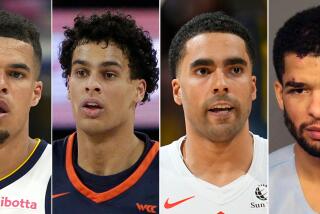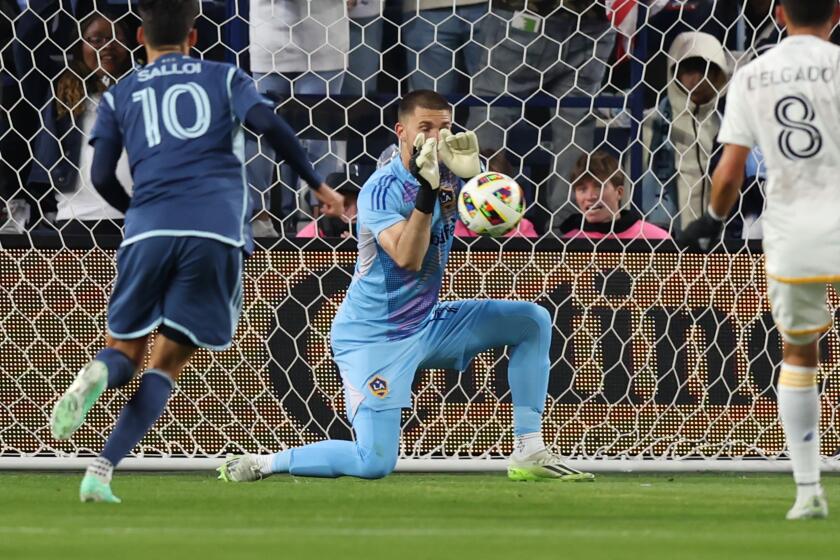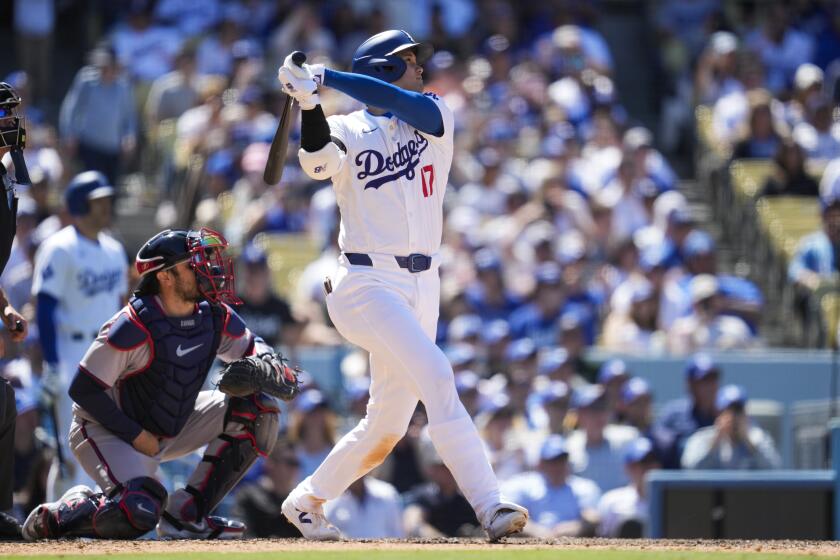BILL HODGES IS BACK FROM NOWHERE : Former Indiana St. Coach Rebuilds Life in Georgia, Hears Birds Singing Again
Traveling on the only road leading to this typically small southern town, more than two hours from suburban civilization, can be a lonely experience for someone unaccustomed to rural bleakness.
For miles, the only signs of life are sprawling farms with hay rolled up like giant balls of twine, roadside motels with perpetual vacancy signs and stores advertising bait and tackle here, a sale on chain saws there. You see more cows than cars along the way.
“Sometimes when you’re out on that road, I guess it could seem like the middle of nowhere,” Bill Hodges says.
Milledgeville, however, is far from nowhere to Hodges. Nowhere is where Hodges spent the years after his short but memorable career as basketball coach at Indiana State had unraveled in tragedy by the spring of 1982.
Now, four years removed from the big time at Indiana State and two years since he last held a coaching job, Hodges has followed the road here to Milledgeville (pop. 12,176) and become the coach at Georgia College.
No, not the high-profile University of Georgia, which gave us Herschel Walker and Jan Kemp. That’s about 60 miles up the road in Athens. This is just plain old Georgia College, an NAIA school with an enrollment of 3,900, no football team and a heretofore anonymous basketball program.
But Hodges, who coached Larry Bird and Indiana State to 33 straight wins in 1978-79 before losing to Magic Johnson and Michigan State in the NCAA final, can truthfully say that he has never been happier than he is here.
“Bill told me recently that this reminded him of the situations that had been the happiest in his life,” Mike Peeler, Georgia College’s athletic director, says.
Hodges, looking out of his sparsely furnished office on a rainy morning, concurs with a simple nod.
“I’m happy, and that’s the important thing,” he says, softly. “The whole atmosphere here is great.”
Not a lot of good things have happened to Hodges since the watershed 1978-79 season, when his team came so close to an undefeated season and the national championship.
Technically, Hodges was Indiana State’s interim coach that year, an assistant filling in because Bob King, the head coach, had suffered a heart attack before the start of the season.
Bird left for the National Basketball Assn. the next year, but Hodges stayed on as coach when King retired. The glory ended abruptly:
--Hodges’ teams totaled just 34 wins the next three seasons.
--His wife left him, instigating a bitter divorce.
--Then, prize recruit Kevin Thompson, a hometown star from Terre Haute whom Hodges had known well, died of cancer late in the 1981-82 season.
The day after Thompson’s death, Hodges quit, probably saving Indiana State officials the trouble of firing him.
Unable to find another head coaching job on the college level, Hodges spent a year at Palm Beach Junior College in Florida, then a year as an assistant to Dave Buss at Cal State Long Beach. When Buss was fired in 1984, Hodges was out of work once again. This time, he could not find a job in coaching.
In what Hodges now calls the lowest point in his life, he returned to Florida and sold insurance. He continued to send out his coaching resume, to colleges large and small.
There were two long years of waiting for the phone to ring. When Georgia College finally called, Hodges hit the road to Milledgeville as fast as he could.
And he found it wasn’t such a lonely road, after all.
At first glance, it might seem that Hodges has been enduring a Faustian existence, as if he had made a pact that he would achieve nearly everything a coach desires in one season, then to suffer through hell ever after.
But Hodges never asked for, nor even expected, the sudden success he had at Indiana State. And nobody could have anticipated the nightmares that followed.
Had King not suffered a heart attack before the 1978-79 season, Hodges would probably have remained a nameless, faceless assistant on a Sycamore team that was headed for success no matter who was coaching.
Instead, Hodges was chosen as King’s replacement and his life changed dramatically--for better and for worse.
Even with an extraordinary player such as Bird, it is extremely difficult for any college team to have an undefeated season. But the Sycamores made it through their nonconference and Missouri Valley Conference schedules without a defeat, Bird’s high-flying exploits drawing national attention.
Since Bird in those days turned down most interview requests, Hodges became the central media figure of the team. Andy Warhol once said that it would be nice if everyone could be famous for 15 minutes, but Hodges and fame didn’t get along well.
Here was a pleasant, soft-spoken man from Zionsville, Ind., suddenly having to deal with not only his first major college coaching position but also hordes of reporters asking him why Bird was snubbing them.
“How did I handle it?” Hodges asked, repeating the question. “Not well. It got to the point where I wanted to hide. It became a negative thing with me and my wife. I understand now how Hollywood can ruin people. Overnight, you get more than you can stand. It gives you problems you never had to deal with before.”
The attention was one of Indiana State’s rewards for being a nationally ranked team. But Hodges wanted the Sycamores to earn the ultimate reward--an NCAA title--so he spent even more time than usual at his job.
With less than a year of head coaching experience, he found himself in the NCAA semifinal against DePaul and venerable Coach Ray Meyer. Bird carried Indiana State to a two-point win over the Blue Demons, but Michigan State beat the Sycamores by 11 points in the championship game.
Hodges still has a tape of that game. He watches it occasionally--and still gets frustrated.
“It was nothing Michigan State did,” Hodges said. “We just shot so poorly (42%) that there was no way we could win.”
Looking back on his Final Four experience, Hodges said: “I enjoyed every minute of it. It was like Dorothy must have felt going to Oz.”
Then came the fall. In 1979-80, Indiana State did not fly without Bird, compiling a 16-11 record. That was followed by a 9-18 season in 1980-81 and another just like it.
“We had a complete rebuilding job to do after Larry left, but (Indiana State officials) didn’t have the patience,” Hodges said.
Neither, it turned out, did Hodges’ wife, remarried now and living in Florida. They went through what Hodges calls a messy divorce during Hodges’ final season at Terre Haute.
“My wife just couldn’t handle it,” he said. “All the time I was an assistant (at Indiana State and elsewhere), she figured that after I got a head coaching job I’d be home more. If anything, I was home less.
“She decided that she just didn’t want to be a coach’s wife. That, and the Kevin Thompson thing, just devastated me. Personally, it was more than I could handle.”
Hodges considered Thompson, a strapping 6 feet, 9 inches and 220 pounds, more a friend than a blue-chip recruit. Back in the days when the NCAA still allowed high school players to work out in college gyms during the summer, Thompson and Hodges grew close. There was little question that Thompson would go to Indiana State.
During the summer before his freshman season, Thompson broke a rib. During fall physicals, doctors found that the rib had not healed. After numerous tests, it was discovered that Thompson had cancer.
In a way, Thompson sort of symbolized Hodges’ demise at Indiana State. Thompson’s illness was diagnosed Oct. 14, the day before practice officially began, and his condition worsened throughout the season.
“That, over a whole year, was agonizing,” Hodges said. “I grew to know him so well, and it tore me apart. It was a very long year.”
Something else was hanging over Hodges’ head that 1981-82 season. His contract was due to expire after the season, and school officials told Hodges that he needed a .500 record to even have a chance for a new contract.
“I just had all I could handle,” Hodges said. “That, and the personal onslaught, was enough.”
The onslaught was nowhere near over, though.
Hodges figured that with his background, which included stops at Tennessee Tech and Armstrong State before Indiana State, he could land a head coaching job somewhere. But after looking in vain, he settled for Palm Beach Junior College.
Then, apparently missing the competition of major college basketball, Hodges left Florida in the spring of 1983 to become an assistant to Buss at Long Beach.
When Buss was forced out after compiling a 9-19 record in 1983-84, Hodges was out of coaching, and it was a while before he returned.
“You always look back and say you made mistakes,” Hodges said. “Going to Long Beach was a mistake. Even now, I don’t know why I picked up and left (Florida).
“The lowest I ever was was when I lost my job at Long Beach and couldn’t get another coaching job. I applied for everything. No one would take me. I had a couple days there when I just went to the beach and watched the waves. It was a soul-searching thing. A voice inside told me not to give up. Life wouldn’t have any meaning if I did.”
Hodges eventually returned to Florida, this time to Fort Meyers, as an insurance agent. The plan was to forget about coaching and build a new life. But Hodges soon found that he still wanted to coach.
After all, Hodges figured, he had been on top and had seen the bottom, so maybe he could settle somewhere in between.
“From that championship game on, it was as if someone told me, ‘OK, you’ve got everything you’ve ever prayed for. Now, let’s see how low you can get.’ I tell you it was a downhill slide I couldn’t stop. But I’m back up now.”
On another rainy morning in Georgia, Hodges is sitting in his office explaining the difference between coaching a high-profile basketball team like Indiana State and a basically no-profile program at Georgia College.
Hodges really doesn’t need to make comparisons. A quick look at his office says it all.
There are all the necessities, but little else. Hodges has a desk, a manual typewriter, a phone, a table for meetings with his staff--he has one walk-on assistant and a student trainer--and a chalk board. The walls and most of the floor are bare. There is an old steam radiator in a corner.
“There have been some adjustments for me here,” Hodges says in his customarily casual tone.
The gym--actually just a floor and two baskets, no seating--is early ramshackle. The Colonials play their 11 home games down the road at a military high school gym that seats 1,500. Georgia College’s court is only available to the men’s basketball team for 1 1/2 hours a day, so Hodges has his players warm up and do passing drills in a classroom.
You might expect Hodges to complain about these and other things he never encountered at Indiana State. The opposite is true.
“I love it,” he says. “It’s a lot of fun. Sure, I’m used to doing things certain ways they have never even heard of, but you adapt. The only thing that they need is a gym. Of all the colleges in America, no one deserves a gym more than Georgia College.”
And there will be one. The University of Georgia system has allocated the school money to build a multilevel field house seating 4,000 for basketball. There will also be four racquetball courts, athletic offices and locker-room facilities.
Are the Colonials trying to go big time, what with this once-famous coach and the new building promised?
“It’s important to have athletic teams that are competitive, but we aren’t going to put loads of money into our basketball team, simply because we don’t have it,” Athletic Director Peeler says.
Peeler says he did not know Hodges’ background when he first received his resume in the mail last spring. Georgia College needed a coach because Mike Aldridge decided he would rather stick to coaching the tennis team.
“Yeah, I asked him why he’d applied here,” Peeler says. “After we talked a little while about the insurance business, I realized why he wanted to coach again. He loves doing it.
“I rode up with him to Chattanooga (to play) Tennessee Temple (in the season-opener). There were tears in the man’s eyes at the end of the game. I mean, this wasn’t Indiana State-Michigan State, just Georgia College-Tennessee Temple in front of maybe 2,000 fans. But he was crying.”
Hodges is paid less than $30,000 a year to coach the Colonials, but he gets a break on the rent of a school-owned house about a fast break away from the, er, gym. It has plenty of room, a kitchen and ESPN. What more does a coach need?
Players, for one thing.
Hodges has only three scholarships to divide any way he likes.
About half the players are walk-ons, but Hodges has called on coaching contacts throughout the nation and even in South America in a search for talented players.
The Colonials signed three junior college transfers, two from an Alabama school coached by a close friend and the other from his old school in Florida. Another friend of Hodges’, who is now the assistant coach of the Brazilian Olympic team, told him about a 6-7 forward from Sao Paulo named Orlando Carbolante. Welcome to Milledgeville, Orlando.
“If he can get the language down, he’s going to be awfully good,” Hodges says.
Hodges, who grew up on a farm, never sought the fast lane, which is good in this case because there’s only one lane on the road to Milledgeville.
“It’s a very slow, easy atmosphere, which I love,” Hodges says. “I live next to the campus, so I can be here early and stay late. I’m in constant contact with the players. It’s an almost perfect situation for someone like me.”
It’s not that Hodges is a simple man, or even single-minded. It’s just that he has had enough complications for one lifetime.
“I don’t think there is anything that could happen to me now that could have a bad effect on me,” he says. “I’m prepared for anything.”
More to Read
Get our high school sports newsletter
Prep Rally is devoted to the SoCal high school sports experience, bringing you scores, stories and a behind-the-scenes look at what makes prep sports so popular.
You may occasionally receive promotional content from the Los Angeles Times.






